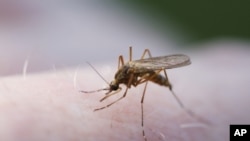A new vaccine initiative has been launched to try to prevent the malaria parasite from developing inside mosquitoes.
Malaria kills about one million people every year, most of them children under age five. Researchers say if successful so-called transmission-blocking vaccines could significantly limit the spread of infection. Once a mosquito bites a vaccinated person, it picks up a substance that interferes with parasite growth.
The Malaria Vaccine Initiative, Johns Hopkins Bloomberg School of Public Health and the Sabin Vaccine Institute are collaborating in the effort.
Dr. Rhoel Dinglasan, an assistant professor at Johns Hopkins, says there are different approaches to a malaria vaccine.
“The malaria vaccines that are currently being perused outside of this transmission-blocking vaccine concept are targeted toward different stages of the parasite life cycle. The most advanced malaria vaccine right now, the RTSS vaccine, is targeted toward prevention of liver stage infection,” he says.
Previous vaccine candidates targeted blood stages of the parasite.
“The manifestation of malaria occurs during red blood cell invasion and rupture. And so vaccines targeted to the blood stages would be curative. It would reduce the symptomology,” he says.
Transmission-blocking
The concept for transmission-blocking vaccines was developed more than 10 years ago. Dinglasan says the concept prevents infection of non-infected humans through the bite of mosquitoes.
“Transmission of the malaria parasite occurs when a mosquito bites an infected human individual and the parasite develops in the mosquito. And then, when it is fully developed and sits in the salivary glands of a mosquito, that mosquito then transmits the parasite to a naive uninfected human host. Transmission-blocking vaccines prevent that from happening,” he says.
So, if a mosquito bites an infected person, who’s received the vaccine, and takes up the parasite from his or her blood, the parasite would not be able to develop inside it.
“We’re not after trying to eradicate mosquitoes. But we’re actually just trying to make them less harmful to us. In this case they would not be carrying the malaria parasite,” he says.
There are several transmission-blocking vaccine candidates in the works, some farther along than the one the Johns Hopkins researcher is working on. But they work differently.
For example, they target a surface protein during a stage when the malaria parasite invades the mosquito mid gut.
“Our vaccine,” he says, “is not targeting the parasite. We are targeting a mosquito molecule. So the vaccine’s intended to generate antibodies in the immunized individual that when taken up into the mosquito, along with the parasites in the blood…will mask the molecule in the mosquito that the parasite needs to invade. If the parasite cannot see it, it cannot invade.”
Dinglasan says the malaria vaccine concept is still a few years away from clinical trials.









